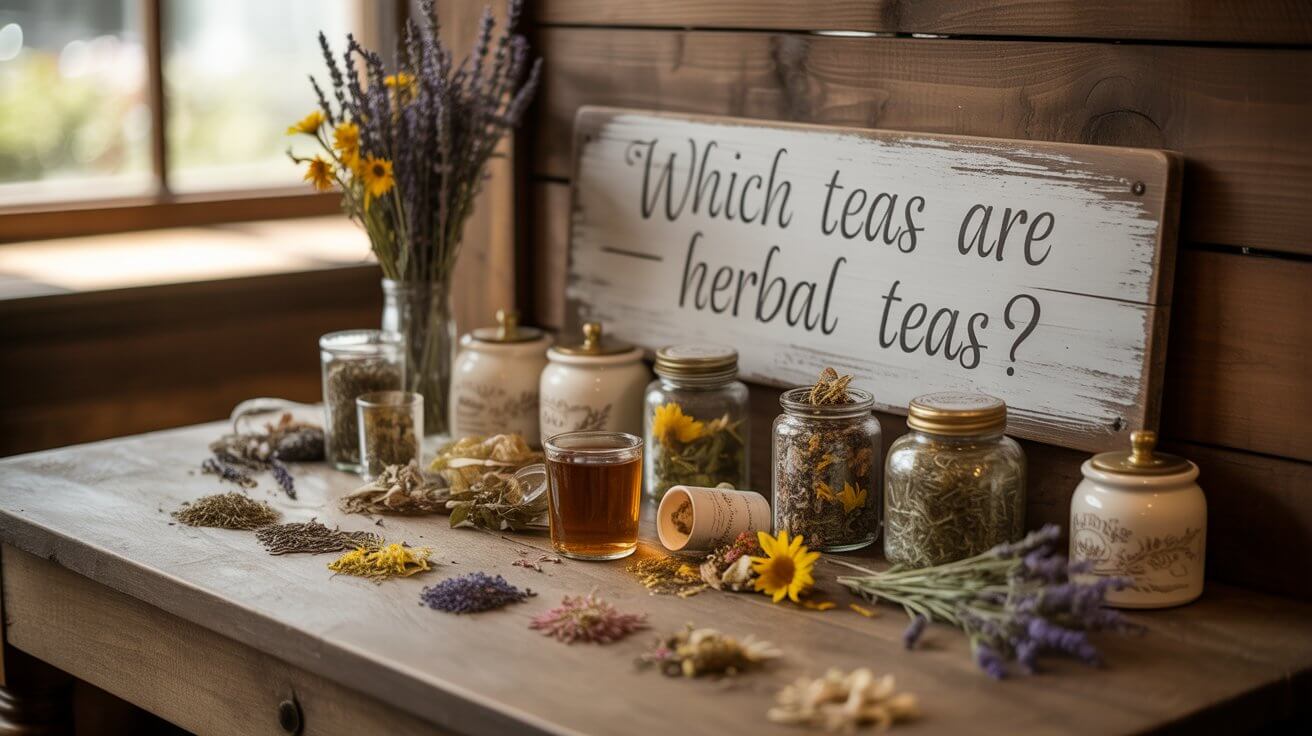When most people imagine “tea,” they think of a steaming cup of black or green tea. But here’s a fun fact not all teas actually come from the same plant. In fact, many of your favorite “teas” aren’t technically teas at all. They belong to a fascinating and ancient category known as herbal teas (or tisanes).
In this 2025 guide, we’ll explore what makes a tea “herbal,” how it differs from traditional tea, and which types deliver the most benefits for relaxation, digestion, and even weight management.
What Exactly Is Herbal Tea?
While true teas all come from the Camellia sinensis plant the source of green, black, white, oolong, and pu-erh tea herbal teas are made by steeping a mix of herbs, flowers, roots, or fruits in hot water.
Because they don’t come from the tea plant, most herbal teas are naturally caffeine-free, making them perfect for evening routines or caffeine-sensitive drinkers.
Many herbal blends have been part of cultural traditions for centuries from Egyptian chamomile to South African rooibos used not only for their flavor but for their healing and calming effects.
Expert Insight: Herbal teas are sometimes called “wellness infusions” today because of their role in supporting sleep, immunity, and digestion without stimulants.
Herbal Tea vs. True Tea: What’s the Difference?
The distinction between herbal and true tea comes down to origin, caffeine, and compounds:
| Feature | True Teas | Herbal Teas |
|---|---|---|
| Source Plant | Camellia sinensis | Various herbs, flowers, fruits, and spices |
| Caffeine Content | Moderate to high | Usually caffeine-free |
| Antioxidants | Catechins, theaflavins | Polyphenols, flavonoids, essential oils |
| Flavor Profile | Earthy, grassy, or astringent | Wide range — floral, minty, fruity, spicy |
| Common Types | Green, black, oolong | Chamomile, peppermint, hibiscus, ginger |
As of 2025, caffeine-free options have seen a surge in popularity especially among people seeking “clean wellness” alternatives to coffee.
Most Popular Types of Herbal Teas (and Why They Matter)
Herbal teas come in hundreds of varieties. Below are the most popular types, including why people drink them and what makes them unique:
1. Chamomile Tea – The Sleep Enhancer
Chamomile remains one of the most researched herbal teas for sleep. A 2024 wellness study found that drinking chamomile tea 30–45 minutes before bed improved sleep quality and reduced nighttime awakenings in over 70% of participants.
2. Peppermint Tea – The Digestive Soother
Peppermint tea helps relax the gastrointestinal tract. Many users notice reduced bloating and a fresher feeling after meals. It’s also one of the most recommended teas for those cutting back on caffeine.
3. Rooibos Tea – The Red Antioxidant
Native to South Africa, rooibos contains aspalathin an antioxidant not found in green or black tea. It’s caffeine-free and may support heart and skin health according to recent 2024 nutrition reviews.
4. Hibiscus Tea – The Heart Helper
Hibiscus tea’s bright crimson color and tangy flavor come with science-backed benefits. Research has shown that regular consumption can help lower blood pressure and support cholesterol balance, making it a smart daily choice.
5. Ginger Tea – The Metabolism Booster
Ginger tea’s spicy warmth isn’t just comforting studies in 2025 link ginger compounds to improved digestion and fat metabolism. It’s often included in blends that support natural slimming and detoxification.
6. Lemongrass Tea – The Stress Reliever
Lemongrass offers a clean, lemony aroma that can reduce anxiety levels. It’s also rich in citral, a compound with antimicrobial properties that may support immunity.
7. Lavender Tea – The Mood Calmer
Lavender’s essential oils contribute to relaxation and may help with mild anxiety or headaches. Perfect for unwinding before bed.
8. Fruit Infusions – The Flavorful Hydrators
Fruit-based blends made with berries, apple, or citrus provide vitamin-rich hydration. They’re naturally sweet, making them a healthy alternative to sugary drinks.
Health Benefits of Herbal Teas (Backed by 2024–2025 Research)
While herbal teas aren’t medical treatments, their natural compounds support overall wellness. Here’s what current studies and user experiences show:
-
Supports relaxation and better sleep: Chamomile, lavender, and lemon balm help reduce cortisol and improve rest quality.
-
Aids digestion and metabolism: Peppermint, ginger, and fennel teas can reduce bloating and stimulate digestive enzymes.
-
Boosts antioxidant intake: Rooibos and hibiscus help combat oxidative stress.
-
Hydration-friendly: Since herbal teas lack caffeine, they contribute to daily water intake.
Note: Some herbs, like licorice root or hibiscus, may interact with medications. Always check with your doctor if you have health conditions or are pregnant.
Herbal Teas for Slimming and Weight Support (As of 2025)
In 2025, “metabolism-friendly” teas are trending among wellness communities. Ingredients like ginger, peppermint, and hibiscus are at the forefront of natural weight management blends.
Herbal blends like All Day Slimming Tea combine these metabolism-supporting ingredients in a single, delicious formula. Users often report feeling lighter and more energized throughout the day.
Final Thoughts: Exploring the World of Herbal Teas
So, which teas are herbal teas?
Any infusion made from herbs, flowers, fruits, or spices rather than the Camellia sinensis plant qualifies.
Whether you’re seeking a calming nighttime drink, a digestion aid, or a slimming support blend, herbal teas offer a natural path to better wellness in 2025.
From the gentle sweetness of chamomile to the bold tang of hibiscus, the world of herbal teas is rich, diverse, and worth exploring one sip at a time.


Leave a Reply